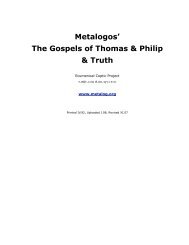Andrew Louth - Syriac Christian Church
Andrew Louth - Syriac Christian Church
Andrew Louth - Syriac Christian Church
Create successful ePaper yourself
Turn your PDF publications into a flip-book with our unique Google optimized e-Paper software.
1057A<br />
C<br />
D<br />
B<br />
DIFFICULTY 5 175<br />
simply beyond being; nor did he do ‘human things humanly’,<br />
because they did not take place in a solely fleshly way, as<br />
if separated from the Godhead, for he was not only a man; ‘but<br />
as God made man he exercised a certain new “theandric” 19<br />
energy amongst us’. For by the assumption of flesh endowed<br />
with an intellectual soul, he truly became man, he who was in<br />
a different way the lover of humankind, and as man he<br />
possessed the divine energy united to the fleshly in an<br />
ineffable union, and fulfilled the economy for our sake<br />
theandrically, accomplishing both divinely things, or to speak<br />
more plainly, exercising the divine and human energy in the<br />
same [person].<br />
Therefore when the wise man makes affirmation of the<br />
union by negation of the division between the divine and<br />
human [properties], he does not ignore the natural difference<br />
between what has been united. For the union, in refusing<br />
division, does not harm the difference. If the mode of union<br />
preserves the logos of the difference, to draw out the meaning<br />
of the words of the saint, then since Christ has a double<br />
appellation corresponding to his nature, it is clear that he has<br />
a double energy, if the essential logos of what has been united<br />
in the union has not been diminished in any way in essence or<br />
in quality. But it is not as if, by the negation of the extremities<br />
brought together in the union, there is made an affirmation of<br />
something intermediate. For Christ is not some intermediate<br />
being, affirmed by the negation of the extremities. For there is<br />
a ‘certain new’ thing, characteristic of the new mystery, the<br />
logos of which is the ineffable mode of the coming together.<br />
For who knows how God assumes flesh and yet remains God,<br />
how, remaining true God, he is true man, showing himself<br />
truly both in his natural existence, and each through the other,<br />
and yet changing neither? Faith alone can grasp these things,<br />
honouring in silence the Word, to whose nature no logos from<br />
the realm of being corresponds. ‘Theandric’, then, not simply,<br />
nor as some composite thing, consisting simply neither of the<br />
naked Godhead by nature, nor of mere humanity, nor being a<br />
composite nature, a kind of borderland between two extremes,<br />
but most naturally existing as God made man, that is as<br />
perfectly Incarnate. Nor again is this ‘new’ to be thought of as<br />
‘single’, 20 nor as a ‘single capacity’; for this ‘newness’ is not a<br />
matter of quality or quantity, since the definition of every<br />
nature is constituted by the logos of its essential energy, which<br />
is not double, like the griffin 21 celebrated in myths. Given this,<br />
how could such a being, with one energy, and that a natural




